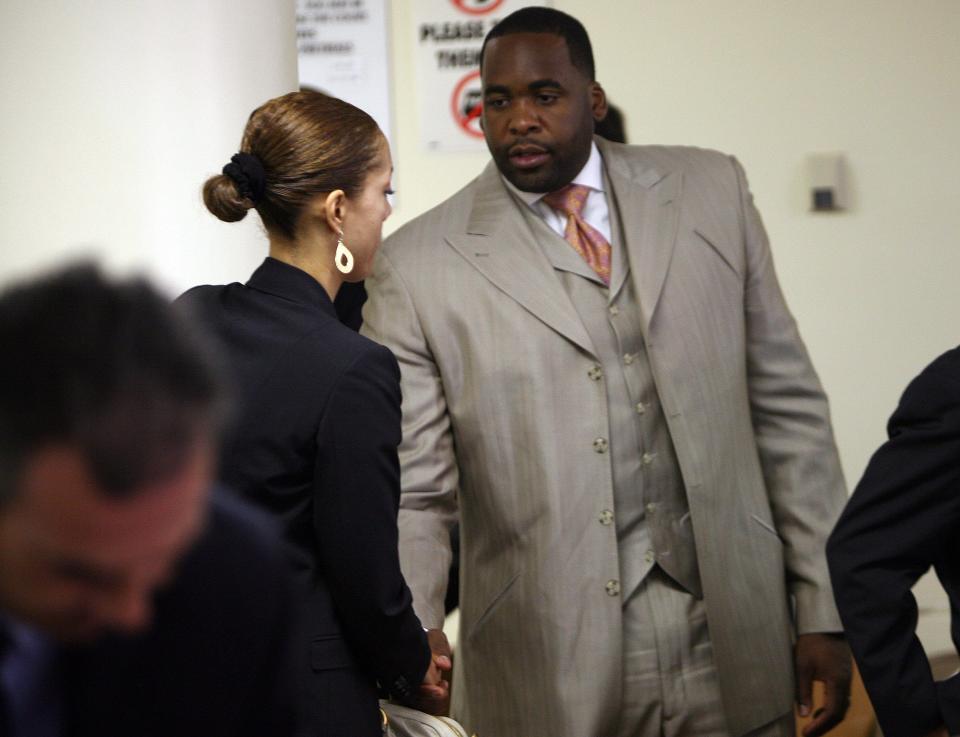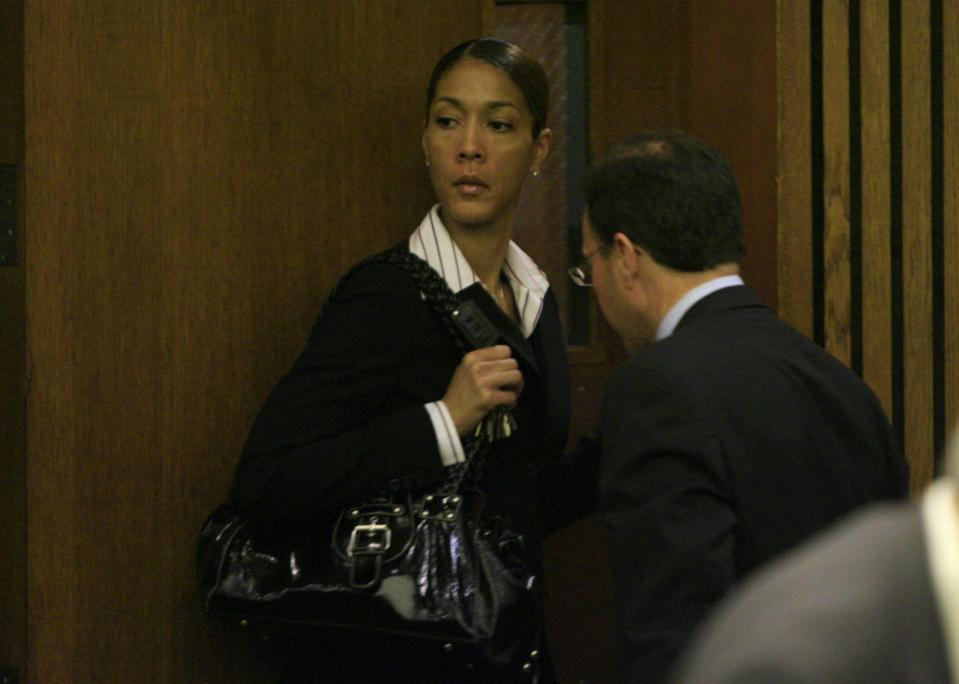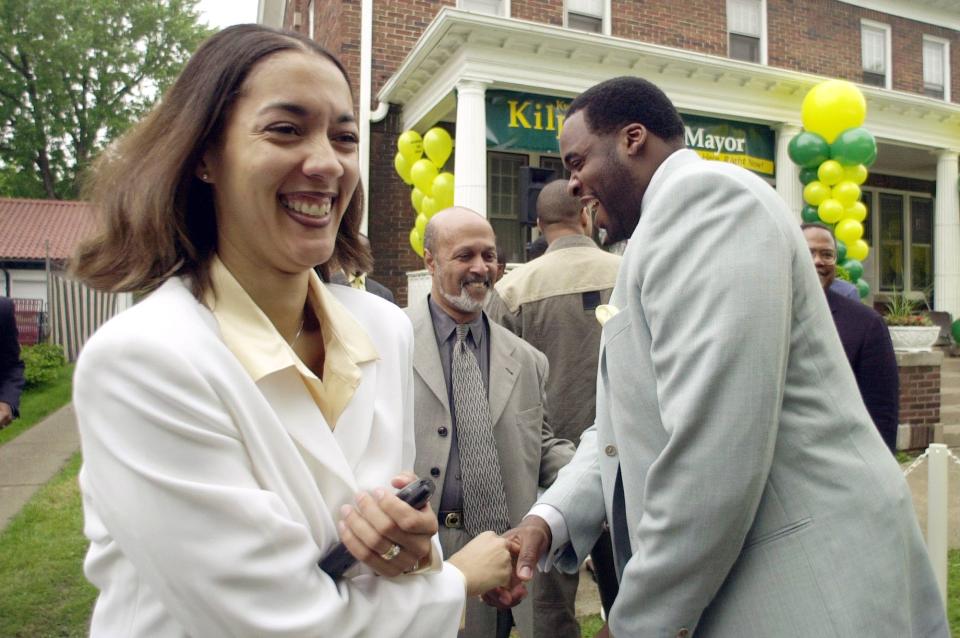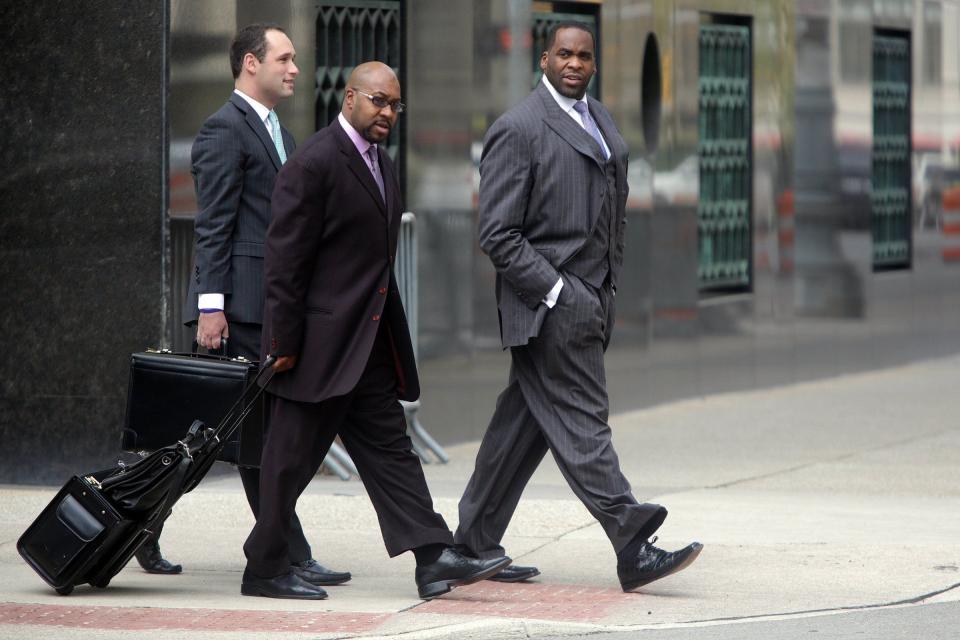Christine Beatty is back, refusing to answer questions or pay restitution to Detroit
Stop me if you've heard this one before: A leader of the most corrupt administration in recent Detroit history gets a job at a nonprofit, returns home and refuses to say why they stopped paying the restitution they owe to Detroiters.
Before you say you heard it all right here a few weeks ago when I wrote about former Detroit Mayor Kwame Kilpatrick, consider that I'm referring to Hizzoner's former classmate, political partner, hatchet woman, lover and co-defendant Christine Beatty.

Kilpatrick loves attention so much that if he had been caught in a searchlight trying to break out of prison he would have stopped to pose for pictures. But Beatty prefers to stay in the shadows. That's one reason it took so long for some of us to learn Beatty has been back in metro Detroit for two years, working for The Heat and Warmth Fund, commonly known as THAW, a nonprofit that helps people keep the heat and lights on.
In a situation reminiscent of the bad old days, when Kilpatrick and Beatty ran city hall like an employment agency for friends and family, Beatty was hired by one of her best buds from high school. THAW CEO Saunteel Jenkins also hired Beatty's mother, but she told me her longtime friendship with Beatty was not a factor in her decision to hire her fellow Cass Tech Class of 1988 alumna and her mom. More on that later.
Beatty refused repeated requests to discuss her gig or her life since leaving Detroit for Atlanta about 15 years ago. That may be because her friends and colleagues made it clear she also didn't want to answer my questions about why we should trust Beatty to do better at THAW than she did while helping run one of the most corrupt nonprofits in Detroit history.
I also detected no enthusiasm for explaining why Beatty has not made a payment since Dec. 2, 2013, on the more than $78,000 in restitution she still owes us. In 2009, Beatty agreed to pay Detroit $100,000 and do a few months in jail as part of a plea deal she cut to avoid going to trial in Wayne County on perjury and obstruction of justice charges stemming from the text message scandal Jim Schaefer and I revealed in the Free Press on Jan. 24, 2008.

For a week, I entreated, begged and, ultimately, pleaded with Beatty's colleagues, Beatty's lawyer and a public relations professional representing THAW to say something — anything — about Beatty's journey. All I got was a 15-word statement Beatty's lawyer conveyed by — what else? — text message.
It said: "For the past 15 years I have been raising my children and rebuilding my life."
Beatty had plenty to say in 2016, when she was launching a radio talk show and starring in a cable TV reality show. In interviews with channels 2, 4, and 7 she even said she missed Kilpatrick.
I suspect the main reason Beatty refuses to speak with me now is because she sees no profit in it.
Puzzle pieces
This is the part of the column where I planned to let Beatty tell us about her life since she left Detroit for Atlanta in 2009 or 2010. Instead, we're left with what we can glean from social media, public records and a biography on the website for the From the Bottom Up Foundation, a nonprofit which offers resources "to meet the psychosocial and socioeconomic challenges disproportionately impacting minority women and girls."
Beatty's LinkedIn profile say she worked as a self-employed consultant until 2017, then worked as a consultant or project manager for companies in Georgia until late 2019. Her bio says she mentored young women in Atlanta and Detroit.
Beatty's bio says she saved the city $30 million by negotiating pay and benefit cuts for union workers, but fails to mention that she and Kilpatrick cut more than 4,000 city workers while hiring more than two dozen friends and family, whose salaries jumped 36% between 2002 to 2007.
Beatty's online profiles also neglect to mention the more than $8 million in taxpayer money she and Kilpatrick spent in a failed attempt to bury their incriminating text messages. Nor do they cite the Kilpatrick administration's failure to adjust the city's spending to its shrinking revenues as Detroit racked up prodigious debt on its way, in July 2013, to becoming the largest municipality in United States history to file for bankruptcy.
Beatty actually beat Detroit to bankruptcy, filing in October 2012. Those court records provide what may be the most objective source of information about her early years in Atlanta, as well as her income.
Beatty's filing came a few weeks after Ford sued her in DeKalb County Court. Court records list her residence as a townhouse in Atlanta and her 2010 income at $77,000 and 2011 income at $102,000. The records say her 2012 earnings dropped to $34,000, even though she listed her income at about $7,000 a month (which would total $84,000 a year). Her largest creditors were the bank which gave her a mortgage on a Rosedale Park home Kilpatrick helped her acquire using questionable means; the IRS, which she owed $60,000; and Ford Credit, which financed her 2011 Explorer.
A judge agreed to discharge Beatty's debts in February 2013. She continued to pay $500 a month on her restitution bill until December 2013.
During her January 2016 media blitz to promote her radio and television endeavors, she told Fox 2's Charlie Langton she would resume restitution payments "once I get a regular income. I haven't had that for a few years."
Curiously, Beatty's LinkedIn bio makes no mention of THAW, where she has been getting a "regular income" since March 2021.
Nevertheless, Beatty hasn't paid a dime in restitution for more than a decade.
Setting the record straight
Despite Beatty's boisterous biography on the From the Bottom Up Foundation's website, Beatty's supporters say she has had trouble getting a good job because of the taint from the text message scandal. Jenkins, her longtime friend and current boss, told me she hired Beatty because of her skills and because everyone deserves a second chance.
"We both know what happened 15 years ago," Jenkins told me. "As I recall, it wasn't her work that was questioned, it was things that did not have to do with the job itself that was being questioned, and they were legitimate questions. But it's been 15 years. People change, people grow, and I think the city has moved on. Chris deserves an opportunity to do the same."
Beatty's supporters repeatedly peddle the false narrative that the only thing she did wrong was fall in love with the wrong man and lie about their affair while under oath. One apologist told me she has repaid her debt to society, which in light of the $78,816 she still owes in restitution, is literally not true.
But I also believe in second chances. And I believe in the mission of THAW, which I have supported as a donor and volunteer.
I also believe it's important to set the record straight.
The record shows that Beatty was a ruthless manager who abused her authority, helped Kilpatrick run a nonprofit larded with tens of thousands of dollars in bribe money, ruined a cop's career to cover up police misconduct and her affair with the mayor, and conspired with a crooked contractor to help him get dirty deals that cost Detroiters and everyone else in southeastern Michigan millions of dollars.
That record raises some important questions, including: Should public money go to someone who doesn't pay their debt to the public? Was Beatty the best candidate for the job? Is the so-called Cass Tech Mafia that stocked city hall with Kilpatrick's and Beatty's family and friends back — this time operating at a nonprofit whose mission is to help families struggling to keep the lights on and their homes warm?
Beatty has known Kilpatrick since the mid-1980s, when they became friends at Cass Technical High School in Detroit. He went to Florida A&M University, while she received a bachelor's degree in social work at Howard University in Washington, D.C.
While finishing up her master's degree in social work at Wayne State, she ran Kilpatrick's successful 1996 campaign to succeed his mother in the Michigan House of Represenatives. She also helped manage his successful 2001 campaign for mayor, then became his chief of staff.

In between the state House and mayoral campaigns, Beatty helped Kilpatrick with the Kilpatrick Civic Fund, a nonprofit created for the stated purpose of educating voters and making life better in Detroit. The fund first made news in 2001 when the Free Press revealed that Kilpatrick wrote a letter of recommendation for a homeless shelter seeking a multimillion dollar government contract after the businessman donated $50,000 to the civic fund.
Text messages later revealed that Kilpatrick was using the nonprofit as a slush fund to pay for his lavish lifestyle, including covering expenses for the mayor and Beatty to take a romantic getaway to a resort in Vail, Colorado.
The homeless shelter operator testified in 2012 at Kilpatrick's federal public corruption trial that the mayor and his family routinely demanded money from him while he sought their help with a city deal and that he paid them more than $440,000. Another businessman seeking city contracts testified that Beatty told him to give $10,000 to the civic fund. He said he didn't consider the donations a bribe, but acknowledged he did eventually get some city work.
In city hall, Beatty was known for being intense, impatient, intelligent, hardworking and equal parts abrasive and charming. Mayoral appointees she deemed less than committed to the cause of advancing Kilpatrick's career faced consequences ranging from a tongue lashing to termination.
In 2003, Beatty and Kilpatrick retaliated against a police officer who reported misconduct by Kilpatrick cronies on the security team and they conspired to ruin the career of a deputy police chief preparing to investigate those allegations. A year later, Beatty told cops who pulled her over for speeding: "Do you know who the f--- I am?"
Also in 2004, Beatty and Kilpatrick defended using their city positions to persuade a bank to give Beatty a grant from a fund created to help low- and moderate-income Detroiters buy homes or start businesses in the city. Beatty's salary was more than $140,000. Even though the bank advertised grants of $2,500, Beatty got $12,000. She used the money as part of a down payment on a gorgeous $255,000 Tudor-style home she bought in Rosedale Park.
Only Kilpatrick, Beatty and their apologists saw the deal as anything other than a violation of the city charter's prohibition on employees using their position for private gain. The charter also instructed city employees to avoid behavior that gives the appearance of impropriety.
Text messages show Beatty used her position to help her friend and Kilpatrick best buddy Bobby Ferguson get tens of millions worth of city contracts.
My Free Press colleague Jennifer Dixon and I, using text messages Schaefer and I obtained, revealed that Beatty gave Ferguson inside information on city deals, strategized on how they should vote on contracts, and expressed concerns that other contractors might get work instead of Ferguson.

Beatty and Ferguson served together on the Downtown Development Authority, a quasi-governmental agency that awarded tens of millions in contracts to reinvigorate Detroit's central business district. When the board met on April 16, 2003, Beatty sent Kilpatrick a text about a deal under discussion that said: "Why not Bobby in this?"
"Bobby," Kilpatrick responded, "wanted to strategically lose a major bid. He will be on this one at bid time."
Midway through a May 7, 2003, Downtown Development Authority meeting, before board members voted to award a $146 million deal to restore the vacant Book-Cadillac hotel, Beatty sent Ferguson a text that said: "You need to recuse yourself from the vote, not abstain."
Ferguson replied that a development authority official: "told me to abstain don't have a contract yet … just playing it safe, deal not complete yet."
"Cool," Beatty wrote back, "just checking."
Ferguson, who did not disclose his interest in the deal before the vote, got a $7 million contract to do demolition on the Book-Cadillac project.
Beatty's lawyer has said the Free Press misinterpreted those and other text messages indicating a cozy, if not outright corrupt, connection between Beatty and Ferguson.

Federal prosecutors made it clear they believed Beatty was in cahoots with Ferguson. In the sentencing memorandum they wrote for Ferguson after he and Kilpatrick were convicted in 2013 of racketeering and turning Detroit City Hall into a hub of corruption where pay-to-play was the law of the land, they say Beatty helped Ferguson squeeze a Detroit contractor.
The feds said Ferguson wanted Walbridge Aldinger to give him 35% of a $140 million water department contract they were seeking.
Ferguson, federal prosecutors wrote, "arranged for the mayor's chief of staff, Christine Beatty, to delay the bidding to buy time for Ferguson to strong arm Walbridge to enter the improvident deal."
After Walbridge refused to give in to Ferguson's demands, they lost out on the contract.
Beatty's supporters contend that if the feds really thought she was a crook, they would have charged her.
It's a persuasive argument, if you don't know the backstory.
M.L. Elrick: Michigan lawmakers demonstrate why our new state bird should be the chicken
Prosecutors had to make hard choices to keep the case focused on the five people they did charge — Kilpatrick, Ferguson, Kilpatrick's dad Bernard, former city chief administrative officer Derrick Miller and former water department boss Victor Mercado. Even after Miller and Mercado cut plea deals, the trial dragged on for six months. The feds also wanted to avoid any chance jurors would get distracted by the affair or think the government was prosecuting immorality instead of illegality.
Andy Arena, who was special agent in charge of the Detroit office of the FBI during much of the Kilpatrick corruption investigation, said prosecutors don't always charge everyone they have evidence against. The reasons range from cutting a break for someone who cooperated, to trying to manage public perception, to — as in the Kilpatrick prosecution — trying to keep a case from becoming unwieldy.
"In my career I've seen a number of people not charged who could have been charged," Arena told me.
While Beatty avoided federal court, she could be headed back to court in Wayne County. Prosecutor Kym Worthy plans to file a motion compelling Beatty to resume paying restitution. Worthy plans to file a similar motion against Kilpatrick, who also hasn't made a restitution payment in 10 years.
A second chance
THAW is a special nonprofit with a vital mission to help people struggling to pay their utility bills keep the lights on, the heat pumping and the water flowing. It has been around for nearly 40 years and receives millions of dollars in grants from our state and federal governments, from DTE, corporations and foundations, special events and donors like you and me. Last year, it spent about $16 million helping keep more than 10,000 of our neighbors alive.
Besides their time together at Cass Tech, Jenkins, THAW's CEO, also knows Kilpatrick and Beatty from their time together in city hall, where she worked for the late Detroit City Council President Maryann Mahaffey. Jenkins was elected to the City Council in 2009 and served until 2014, when she resigned to lead THAW.
In 2021, THAW hired Beatty as a contractor for a short-term project, then she was given another assignment replacing the nonprofit's customer management system. Jenkins said she did not recall whether anyone else was considered or interviewed before Beatty got those jobs. Jenkins said Beatty was interviewed before she was hired as a THAW program manager in May 2022.
"I need to say this to you: She's highly qualified and had the skills for all three of those roles," Jenkins told me. "Chris continues to do a great job in the role she's in. I don't have any issues. I know that our dollars are being spent well for the purpose in which they're intended."
M.L. Elrick: Michigan lawmakers make time to free Harbaugh instead of working to fix flawed reform bills
Jenkins and I disagree on how well Beatty helped run the city as Kilpatrick's chief of staff. She told me she believes the only thing Beatty did wrong was lie under oath about her affair with their friend, the mayor. Jenkins said her relationship with Beatty and her mother played no role in her decision to hire them. And she says she's not worried donors may think twice about giving to an organization that will spend some of their money on Beatty's salary.
Jenkins would not disclose Beatty's salary, but IRS forms THAW is required to make public do not list Beatty among the nonprofit's five highest-paid employees. Jenkins also declined to discuss Beatty's failure to make any restitution payments, even after landing a job with THAW.
"If you want to talk about Chris' restitution, you should talk to her attorney, because that's the best person to talk about it," Jenkins said.
I'd say Beatty is the best person to talk about it, but she doesn't feel she owes us any explanations.
She does, however, owe us a lot of money.
M.L. Elrick is a Pulitzer Prize- and Emmy Award-winning investigative reporter and host of the ML's Soul of Detroit podcast. Contact him at [email protected] or follow him on Twitter at @elrick, Facebook at ML Elrick and Instagram at ml_elrick.
This article originally appeared on Detroit Free Press: Christine Beatty back in Detroit, still owes restitution
Solve the daily Crossword

